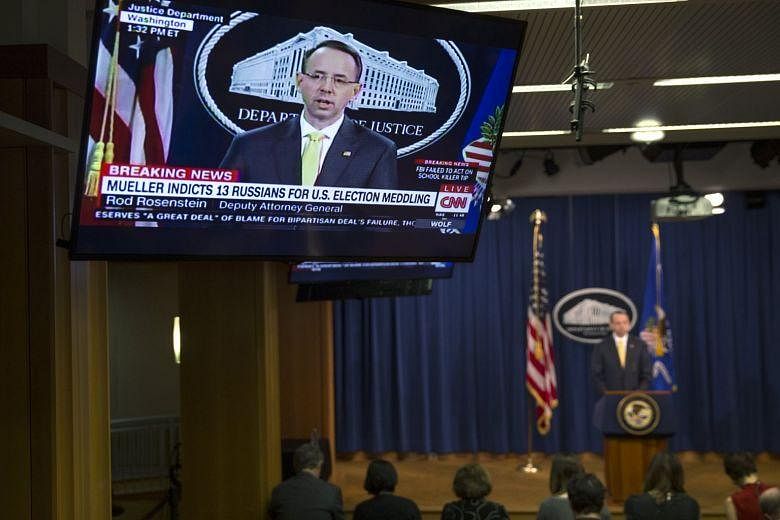NEW YORK • Bags of cash delivered to a Rome hotel for favoured Italian candidates. Scandalous stories leaked to foreign newspapers to swing an election in Nicaragua. Millions of pamphlets, posters and stickers printed to defeat an incumbent in Serbia.
The long arm of Russian President Vladimir Putin? No, just a small sample of the US' history of intervention in foreign elections.
Last Tuesday, US intelligence chiefs warned the Senate Intelligence Committee that Russia appears to be preparing to repeat in the 2018 midterm elections the same full-on chicanery it unleashed in 2016: hacking, leaking, social media manipulation and more.
Then, on Friday, the Federal Bureau of Investigation (FBI) announced the indictments of 13 Russians and three companies, run by a businessman with close Kremlin ties, laying out in astonishing detail a three-year scheme to use social media to attack the Democratic presidential candidate in the 2016 elections, Mrs Hillary Clinton, and boost Mr Donald Trump and sow discord.
Most Americans are understandably shocked by what they view as an unprecedented attack on the US political system. But intelligence veterans and scholars have a different, and quite revealing, view.
"If you ask an intelligence officer, did the Russians break the rules or do something bizarre, the answer is no, not at all," said Mr Steven Hall, who retired in 2015 after 30 years at the Central Intelligence Agency (CIA), where he was the chief of Russian operations.
Dr Loch Johnson, the dean of US intelligence scholars, who began his career in the 1970s investigating the CIA as a staff member of the Senate's Church Committee, said Russia's 2016 operation was simply the cyber-age version of standard US practice for decades, whenever US officials were worried about a foreign vote. "We have been doing this kind of thing since the CIA was created in 1947," said Dr Johnson, now at the University of Georgia. "We have used posters, pamphlets, mailers, banners - you name it. We have planted false information in foreign newspapers. We have used what the British call 'King George's cavalry': Suitcases of cash."
The US departure from democratic ideals sometimes went much further. The CIA helped overthrow elected leaders in Iran and Guatemala in the 1950s, and backed violent coups in several other countries in the 1960s. It plotted assassinations and supported brutal anti-communist governments in Latin America, Africa and Asia.
But in recent decades, both Mr Hall and Dr Johnson argued, Russian and US interferences in elections have not been morally equivalent. US interventions have generally been aimed at helping non-authoritarian candidates challenge dictators. Russia has more often intervened to disrupt democracy, they said.
At least once, the hand of the United States reached boldly into a Russian election. US fears that Mr Boris Yeltsin would be defeated for re-election as president in 1996 by an old-fashioned Communist led to an effort to help him. It included an American push for a US$10 billion International Monetary Fund loan to Russia four months before the voting, and a team of US political consultants.
In recent decades, the most visible US presence in foreign politics has been groups like the National Endowment for Democracy, the National Democratic Institute and the International Republican Institute, which do not support candidates but teach basic campaign and election skills.
The National Endowment for Democracy gave a $23,000 grant in 2006 to an organisation that employed Aleksei Navalny, who years later became Mr Putin's main political nemesis, a fact the government has used to attack both Mr Navalny and the endowment. In 2016, the endowment gave 108 grants totalling US$6.8 million (S$8.9 million) to organisations in Russia for such purposes as "engaging activists". Most Americans view such efforts as benign. But Mr Putin sees them as hostile.
NYTIMES
Correction note: An earlier version of this article stated incorrectly that Aleksei Navalny, a political opponent of the Russian President, Vladimir Putin, had received grants from the National Endowment for Democracy. In fact, an organisation employing him received one $23,000 grant from the endowment in 2006. The New York Times has edited its article to reflect that.

